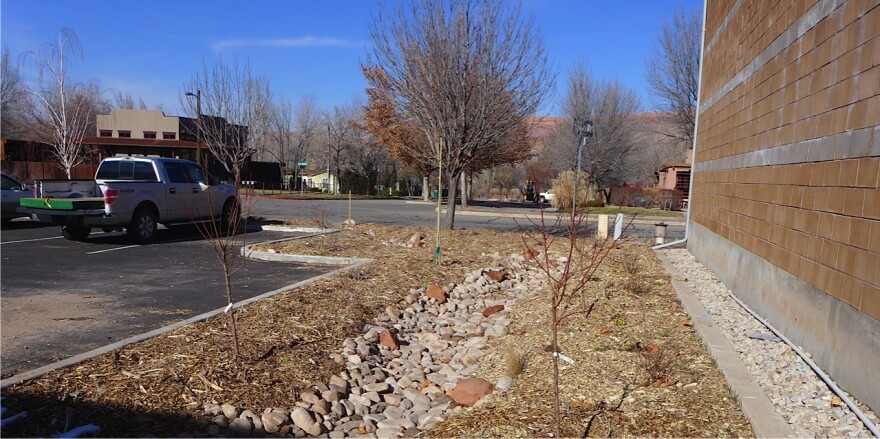On the Logan main campus, work is underway on a permaculture teaching garden, which will demonstrate alternatives for dealing with storm water in the city. A USU Professor is now doing the same thing in Moab.
Like many Utah towns, Moab struggles to conserve water. There’s still a lot of Kentucky bluegrass, with the sprinkler runoff flowing down the gutters, heavy irrigation for hobby alfalfa farms, aggressive storm drainage, and the city still sells tap water to oil and gas drillers. Enter Dr. Roslynn Brain, USU professor in Sustainable Communities. During the last year Brain has helped launch an effort to build “rain gardens” all over Moab. She says she was inspired by local bee keeper Jerry Shue.
"He had an idea to put in pollinator gardens throughout the town. Then we found out that people with the USDA Natural Resources Conservation Service, the BLM, there are individuals throughout the community of Moab who are interested in these concepts. And so we all met together and came up with the idea of collaborating on an initiative to put in bee-inspired gardens. There’s already a strong movement in Moab of gardeners and of sustainability. People seem to understand these concepts," Brain said.
The USU program has attracted support from a number of schools, businesses and nonprofits in Moab. From saving local native bees, the goals have grown to include water conservation efforts, food gardening, and creation of new wildlife and “natural” space. Dr. Brain has been aided by Jeremy Lynch, a USU permaculture intern, who previously managed the Moab farmers market.
"When we design these gardens they’re unique to each space and they reflect the ecology of the area. We’re developing gardens reflective of the natural vegetation, and a canopy system wherein we have an overstory, under story, herbaceous layers, that function with one another, that don’t require the yearly, the annual inputs that a typical, conventional, monocultural agricultural system does," Lynch said.
In other words, a rain garden. Besides rain water, it’s hoped that both public and private grey water systems will become part of the picture. Lynch says compared to nearby states, Utah’s laws on greywater disposal are needlessly strict and need to be reformed.
"Figuring out how to implement green infrastructure in town, essentially how to manage water as it moves through the cityscape. Right now we have a lot of gray infrastructure, which we’ll call it, which just tries to flush the water right out of town without utilizing it to any positive end," Lynch said.
Lynch gave me a tour of the rain garden at the USU/Moab campus.
"And the big function of this garden, we call the rain garden, is that we’re harvesting the water off this entire roof up here covering the Walker lumber yard, which flushes out right here, you see it follows a rock swell throughout the entire garden," Lynch said. "And so what this used to be was a big patch of asphalt. We had it excavated out, and then we had a workshop with about 40 local community members. And as you can see now, even though it’s the middle of the winter, there are a number of fruit trees. There are a number of berry bushes, there are some smaller local and native grasses, as well as I think about 800 plants in this one area alone. It’s really beautiful to see it filled up with water – it just looks like its own creek corridor on the way to Pack Creek and Mill Creek. Growing these fruit trees. We’re growing some smaller edible species. The banana yucca we have over there, we have a lot of herbs. We have some thyme right in front of us."
If permaculture does take off in Moab, Dr. Brain envisions a future Moab where the streets are greener and more interesting.
"I would like someone to be walking throughout the town and be able to stop on the way at a community garden and pick some berries, or see the pollinators interacting with perennial pollinator plants, and see that you can grow a beautiful garden without putting in municipal water," Brain said.
So far local partners in the project have included the Moab Charter School, Canyonlands Field Institute, the Youth Garden Project, Community Rebuilds and the Aarchway Inn. If work is to proceed as planned, Dr. Brain says USU must find the funding for a full-time coordinator.



